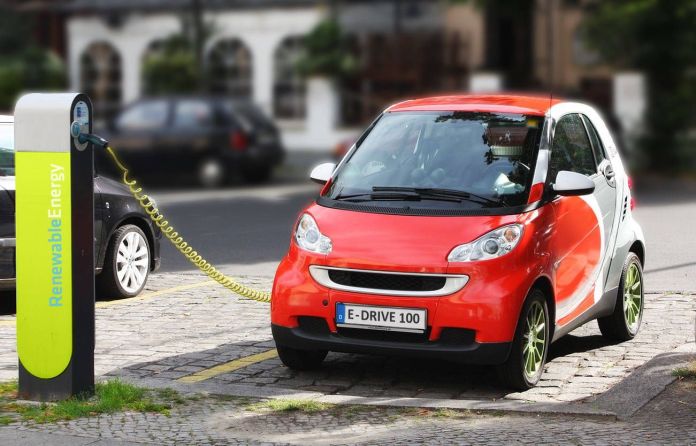Increasing air pollution in emerging economies such as India is a major point of concern. In a bid to reduce pollution and enhance energy independence, the Indian government is taking significant measures such as accelerating the deployment of electric vehicles. In a bid to achieve this aim, the government recently has also unveiled multiple initiatives aimed at promoting the manufacturing and adoption of electric vehicles (EVs).
Efforts by Indian Government

The National Mission on Electric Mobility was launched in 2011, which aims to halt the production and sales of petroleum-based vehicles in India by 2030. The union cabinet also approved the establishment of the National Council for Electric Mobility (NCEM), to make recommendations on such matters.
Further, the government tripled its budget for financing the investment on electric vehicles under its Faster Adoption and Manufacturing of Hybrid & Electric Vehicles (FAME) scheme. The authorities have set aside an allocated budget of INR2,908 crore ($365 million) for FY2023, which is almost ninefold the budget allocated for FY2021.
In accordance, the Indian power ministry has unveiled modified guidelines and standards for EV charging infrastructure such as placing charging stations within a 3-kilometer grid. India now has 1,640 active public EV chargers. In the total number, nearly 940 are installed in 9 cities, including Surat, Pune, Ahmedabad, Bengaluru, Hyderabad, Delhi, Kolkata, Mumbai, and Chennai. The Center for Energy Finance estimates the country may require investments of around $180 billion by 2030, which will pave the path to a sustainable future.
These initiatives are showing positive results due to a rapid acceleration in the growth of adoption of electric vehicles. According to the government’s Vahan portal, India recorded sales of around 311,000 battery-operated vehicles in FY2021, which is substantially higher than 119,000 sold the previous year.
UK unveils India Green Guarantee scheme
At the COP26 summit in Glasgow in 2021, the UK offer a green guarantee financing, which will be a significant step toward India’s sustainable future. The nation is offering an “India Green Guarantee” to World Bank with the goal to offer $904 million for green projects across India.
Additionally, the UK pledged around $253 million in new funding for transformational green projects in developing nations at the UN climate summit, including the development and adoption of electric vehicles (EVs) in India. This funding is part of the Private Infrastructure Development Group (PIDG), which will go to projects such as the production and adoption of electric vehicles in India, issuing green bonds in Vietnam, and utilizing solar energy in Burkina Faso, Pakistan, Nepal, and Chad. These projects are expected to mobilize more than 470 million pounds in additional private sector financing.
How automotive makers are adopting electric vehicles
Apart from the government putting its effort, Indian industry giants are also taking a step toward tackling the problem of increasing pollution. Adoption of electric vehicles is emerging as a prominent solution to this growing problem. The new range of electric vehicles is expected to unravel the problem of growing carbon emissions to an extent. Recognizing the potential of India’s e-mobility plans for pollution-free transportation, many established automakers have developed new EVs for last-mile and long-distance transportation.
Here is the list of initiatives depicting how India is moving towards Sustainable India:

Tata Motors
For instance, Tata Motors, one of India’s largest commercial vehicle manufacturers, has created a strong foothold in India’s electric vehicle market by making some innovative strategic moves to drive this new EV era. For instance, Tata Motors inked an agreement with BluSmart Electric Mobility in June 2022 to deliver 10,000 XPRES T-EVs to the company. With a fleet of 10,000 vehicles, this would be India’s largest-ever EV fleet order. These vehicles are an addition to the 3,500 XPRES T EV order signed by both companies in October 2021. Moreover, with 25,000 Tata EVs on Indian roads and a market share of 87% in FY22, Tata Motors has reshaped the landscape of the Indian automotive market.
Ola Electric
Ola Cabs, the leading ridesharing company created a ruckus in the Indian automotive market by debuting its Ola Electric motor bike in 2021. However, various issues with its bike’s performance caused a lot of controversy. Now, Ola Electric is all set to introduce a new product that is aimed at disrupting the status quo in the industry. The impending electric four-wheeler is set to be unveiled on the occasion of the 75th Independence Day. With this new four-wheeler project, Ola Electric. According to sources, its car is expected to have a long range of over 500 km along with a sporty car built in India.
Mahindra and Mahindra
A leading automaker in the nation, Mahindra & Mahindra, was the first one to launch an electric car in India named Mahindra E2O. Mahindra Electric, recently in July 2022, marked the sales of nearly 50,000 EV three-wheelers also unveiled its plan to launch nearly eight EVs by 2027. The company’s first electric three-wheeler, the Alfa Mini, was released in 2017. After the date, the EV manufacturer unveiled its Treo, Treo Zor, e Alfa Cargo EV, and Treo Yaari models. Apart from that, the firm has been rewarded with a special recognition award from Apollo CV Magazine and the Green Achiever 2022 award.
Conclusion
The scope of electric vehicles is potentially high not only in India but around the world. The electric vehicle manufacturers are continuously making efforts to outperform in this EV race. According to Astute Analytica estimates, the global electric vehicle market is expected to grow at a CAGR of 21.99% during the forecast period from 2022 to 2050.





















I want 2 seater battery cheapest car. I am ready to buy immediately